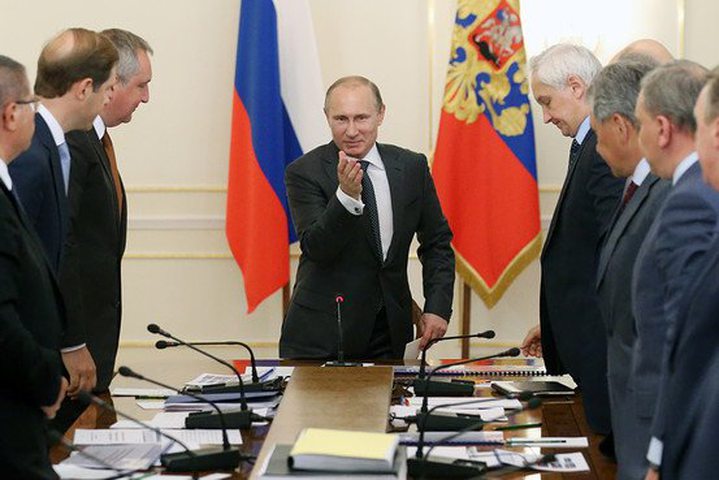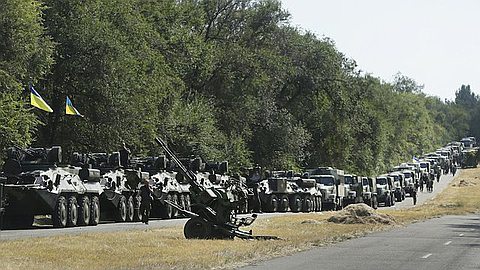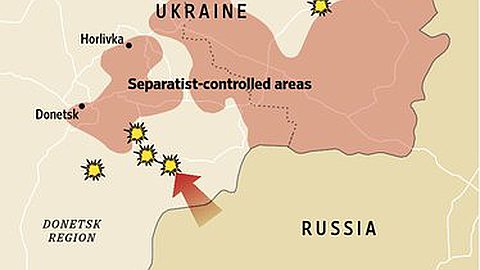Setbacks Complicate Putin's Ukraine Strategy

Pro-Russia rebels in eastern Ukraine saw some of their worst battlefield setbacks in weeks Monday as the West agreed on tougher sanctions aimed at forcing Moscow to cut support for the militias—posing fresh challenges on two fronts for Russian President Vladimir Putin.
Ukrainian forces were advancing from the north and south in an effort to cut off Donetsk, one of two remaining separatist strongholds, from fellow rebels in the other, Luhansk, as well as their supply lines to the Russian border, officials on both sides of the fighting said.
At the same time, the U.S. and Europe said they would adopt the harshest economic sanctions yet on the Kremlin this week. The European Union—Russia's largest trading partner—is expected to move as early as Tuesday to restrict transactions with Russia's state banks, as well as limit technology exports vital for the country's oil and weapons industries. The U.S. has vowed to follow suit.
In the past, every time such sectoral sanctions were threatened, the Kremlin managed to head them off with moves that appeared to signal de-escalation of the conflict. In reality, those moves "were only meant to buy time," a European official said. "Now, they are no longer trying to buy time."
Instead, Moscow appears to be digging in, even as the situation for the pro-Russia rebels in Ukraine deteriorates.
At a hastily called news conference, Igor Girkin, a Russian citizen who is the top defense official in the separatist Donetsk People's Republic, said his forces had evacuated more than 100 wounded fighters to Russia because "I can't rule out the total siege of Donetsk from all sides."
The Donetsk separatists' top political leader, Alexander Borodai, had left for Moscow for consultations, his deputy said.
The new sanctions were agreed to during a conference call Monday that included U.S. President Barack Obama, German Chancellor Angela Merkel, French President François Hollande, U.K. Prime Minister David Cameron and Italian Prime Minister Matteo Renzi.
The leaders agreed Moscow hadn't done enough to deprive the separatists of arms or to push the separatists toward a truce with the Kiev government, U.S. and European officials said. Although Russia offered modest concessions for international monitoring, it has actually substantially stepped up supplies of weapons to rebels across the border, according to Western officials.
"We expect the European Union to take significant additional steps this week, including in key sectors of the Russian economy," said Tony Blinken, Mr. Obama's deputy national security adviser. "In turn, and in full coordination with Europe, the United States will implement additional measures itself."
The Kremlin has taken steps to prepare Russians for deeper international isolation. On Monday, Mr. Putin gathered top defense-industry officials at his residence to discuss how to replace imported technologies amid "risks of a political nature."
In a nationally televised speech to security chiefs last week, he warned that while Russia's nuclear deterrent protects it from military conquest, rivals still seek to undermine the country "in the economic sphere and politically." Mr. Putin vowed to work to head off any such threats to Russia's "sovereignty and territorial integrity."
Mr. Putin's balancing act over the past several months—keeping the pressure on Kiev with covert support for the rebels while avoiding serious economic penalties from the West—had managed to satisfy both the nationalist hard-liners and the business elite within Russia.
But pressure was building even before the Malaysian jetliner was downed over rebel-held territory on July 17, amid growing frustration in Europe with the lack of progress toward a resolution of the crisis. Scenes of separatists roving through the crash site amid the bodies of the victims and their belongings cemented Western support for tough new measures.
The crash created "a completely new situation that makes further-reaching measures necessary," a spokeswoman for Ms. Merkel said Monday.
Broadening the sanctions "will be in some way a disaster," economically and politically, for both sides, said one longtime European diplomat. "But we cannot be indifferent. We had to react."
Even Russian officials have acknowledged that the impact of sectoral restrictions is likely to be much more painful than the sanctions targeting individuals and companies that have been imposed to date—a list that the EU is also preparing to extend to include, for the first time, some Russian oligarchs.
Russia's stock market and currency dropped Monday as investors girded for the worst.
"The room for maneuver is now minimal," says Alexei Makarkin, analyst at the Center for Political Technologies, a Moscow political consultant.
"From the pragmatic point of view, it would probably be best to pull back" and allow the Ukrainian military to defeat the separatists, he said. "But now that's very difficult. The public wouldn't understand."
Some observers say the Kremlin seems to have misread the rising frustration in the West and assumed that the close economic ties with Europe would again save it from tougher action.
Moscow "thought that the West wouldn't go further" with sanctions because the risk of economic blowback would "outweigh moral principles," Alexei Venediktov, editor of independent Ekho Moskvy radio said.
"The situation is much more ominous than it was a week ago," said Thomas Graham, a former White House Russia-policy chief. "Putin is underestimating the West. But are we underestimating how much he will risk in Ukraine?"
European officials said the looming sanctions would be carefully modulated to allow them to be tightened if the situation worsened and lifted if Mr. Putin took real steps toward defusing the conflict.
Pro-Kremlin commentators have warned in recent days that backing down now in Ukraine would lead the West to turn its focus to returning Crimea, which Moscow annexed from Ukraine in March. The threat of a sudden collapse of the separatist forces under pressure from Kiev could also prove intolerable for the Kremlin, spurring even deeper intervention.
Some Kremlin advisers say the conflict with the West is seen in increasingly existential terms in Moscow.
"The long-term [Western] goal—though no one talks about it—is political change inside Russia, regime change, if you will," Fyodor Lukyanov, head of a Kremlin foreign-policy advisory panel, said in an interview Monday with a Russian online-news site. Western officials say the sanctions are aimed only at changing Kremlin policy in Ukraine.
"Expecting Putin to back off, or his close friends to persuade him to change tack or else the 'oligarchs' to pressure the Kremlin into beating a retreat betrays a lack of understanding of the gravity of the situation," Dmitry Trenin, director of the Moscow Carnegie Center, wrote in a commentary Monday. "It is no longer the struggle for Ukraine but a battle for Russia."





